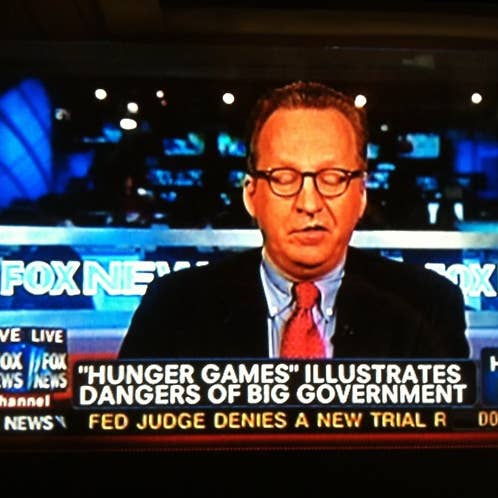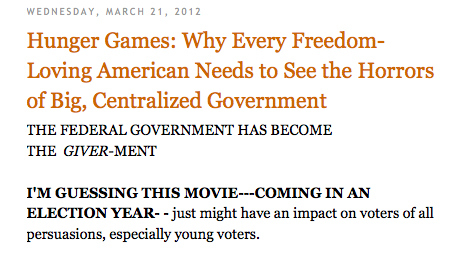Cultural critics are falling all over themselves trying to figure out what "The Hunger Games" is really about. And now we have our answer: it's about creeping socialism, come to kill us all.
John Tammy relies on his "libertarian instincts" to make the case in a Forbes piece whose style makes it hard, at times, to tell where the movie ends and real life begins:
On its face the book reveals the oppressive cruelty that is big government. Indeed, while the global political class and their enablers in the media to this day try to explain away droughts and the resulting famines from an “Act of God” point of view, the simple truth is that economically free countries don’t suffer them.
Though food is surely the most essential, life-enhancing good on the planet, it’s plentiful in the most barren of climates where it’s not grown or farmed owing to the free-trade truth that we trade products for products; all manner of non-perishable items exchanged for food with great regularity. Simply put, visitors to Arizona don’t witness distended bellies among the citizenry due to a lack of farmers, instead Arizona is prosperous and its citizens well fed for the latter pursuing all manner of work the product of which enables them to freely exchange the fruits of their labor for other goods, including groceries.
You guys, he's talking about real life.
He goes on to discuss how people in Ethiopia are starving, because Big Government. (In fact, one of the worst famines in the world is happening right now in a place with no government at all.)

Fox Business had Tammy on to discuss his theory and Fox ran James Pinkerton's piece on the subject:
[W]hat’s truly startling about the movie, then, is its implicit politics: Ordinary folks are good, government is bad--really bad. There are no evil corporations in this movie; the bad guys are bureaucrats and TV hosts.
Taken literally, Hunger Games is a black-helicopter-ish portrayal of state power. But taken figuratively, the film is an Anthem (novella) for our time, a well-crafted cry from the heart against top-down injustice and oppression. Nobody has made a rallying-cry of a movie that’s this effective in a long, long time.
I wonder how Suzanne Collins feels about being compared to Ayn Rand (writer).
Meanwhile, bloggers are latching on. Here's John Monaghan's take:
As with any good book, the meaning is open to interpretation by the reader and should be designed to provoke thoughtful discussion. Any analysis of the environmental drivers that altered the North American continent to such a degree as to usher in such a future, should also talk about the disastrous government policies that prevent their citizens from adapting to the new world.
And Webutante's:

Yes, if Romney wins, he'll have "The Hunger Games" to thank. Just like how after the "Harry Potter" moves came out, everyone became a Satanist.
